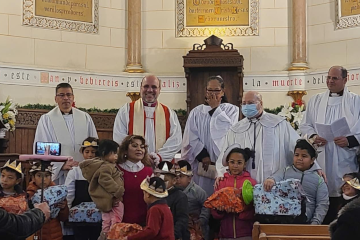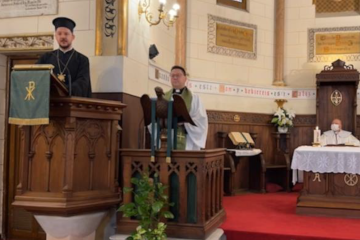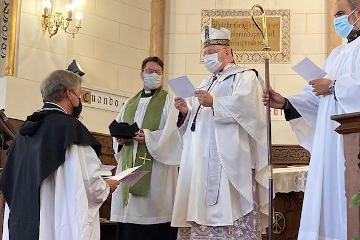
Brandon Ashcraft
La Catedral del Redentor (Madrid, España)
San Marcos 10:46-52
27 de junio 2018
Los cuatro evangelios están repletos de historias maravillosas sobre las milagros de Jesús. Estos milagros, como el que escuchamos hoy sobre el mendigo ciego Bartimeo, fueron importantes en el ministerio de Jesús porque servían como prueba del poder y la autoridad de Jesús. Cuando esta historia aparece en el décimo capítulo del Evangelio de Marcos, Jesús ya ha realizado tantos milagros que le siguen una gran multitud a todas partes. Entonces, uno pudiera preguntarse, ¿cómo es esta historia en particular diferente de las muchas otras historias de milagros en el evangelio? ¿Qué somos nosotros que estamos reunidos dos mil años después para sacar de esta historia? ¿Qué sabiduría nos ofrece para hoy?
Para responder a esta pregunta, sugiero que nos pongamos en el lugar de los personajes de esta historia e intentemos imaginar cómo se pudieran haber sentido. Además de Jesús, hay dos personajes principales en esta historia: Bartimeo y la multitud.
Comencemos con el mendigo ciego, Bartimeo. Puede que muchos de vosotros estén pensando: “Pero no me identifico con Bartimeo porque yo no soy ciego.” Pero intentad usar vuestra imaginación para ir más allá del simple hecho de la ceguera de Bartimeo, y considerad cómo lo habría hecho sentir ciego. Las implicaciones de ser ciego fueron muy diferentes en el tiempo de Jesús de lo que son hoy. Actualmente, un ciego puede tener una vida muy completa y gratificante. Tengo una amiga aquí en Madrid que ha sido ciega de nacimiento, pero ella no está indefensa en absoluto. Tiene una vida muy plena, feliz e independiente. Tiene un perro guía que la ayuda a navegar la ciudad. Tiene una carrera exitosa e incluso posee un negocio próspero. Ha estudiado extensamente y sabe muchas cosas.
En los tiempos de Jesús, sin embargo, nada de esto hubiera sido posible para una un ciego. En aquellos días los ciegos eran impotentes y excluidos de la sociedad. Además, la mayoría de la gente pensaba que ellos eran ciegos porque habían cometido pecados terribles. Hoy, sabemos que tal idea no tiene sentido. Pero en el tiempo de Jesús, esta idea fue ampliamente aceptada y por esta razón, la gente no se hacía amigos de ciegos. Por todas estas razones, el personaje de Bartimeo que encontramos en la historia de hoy se habría sentido muy aislado del mundo. Se habría sentido extremadamente solo. Él habría vivido en un estado de miedo abrumador todos los días. Y a diferencia de mi amiga ciega, él no habría tenido ningún medio para generar ingresos para sí mismo. Su única opción era mendigar. Habría vivido en un constante estado de miedo y ansiedad acerca de dónde vendría su próxima comida.
Entonces, aunque no seamos ciegos, todos podemos identificarnos con el sentimiento de soledad. Al igual que Bartimeo, todos sabemos lo que es sentirse aislado e indefenso de vez en cuando. Y como nosotros aquí en Madrid, donde la tasa de desempleo es muy alta, estoy seguro de que todos sabemos lo que uno siente cuando hay una falta de ingresos, o tener un amigo o familiar que tiene problemas financieros. Si se puede identificar con algunos de estos sentimientos, puede identificarse con Bartimeo.
Ahora deberíamos hacernos esta pregunta: aunque Bartimeo se sentía solo, aislado y abandonado por el mundo, ¿tenía miedo de invocar el nombre de Jesús? ¿Pensaba que debido a que era un pobre mendigo ciego e indefenso, no merecía el amor de Jesús? ¿Pensaba eso porque su sociedad le había rechazado, y que no era digno de ser recuperado por el poder sanador de Jesús? ¡No lo hizo! Marcos nos dice que cuando Bartimeo oyó acercarse a Jesús de Nazaret, “comenzó a dar voces y decir: ¡Jesús, Hijo de David, ten misericordia de mí!” A pesar de todas las señales que recibió del mundo diciéndole que él no era digno del amor de Jesús, Bartimeo tenía fe que Jesús lo escucharía cuando gritara su nombre. Y cuando la multitud “le reprendía para que callase”, ¿se calló Bartimeo y dejó de gritar el nombre de Jesús? ¡Absolutamente no! Marcos nos dice que “[Bartimeo] clamaba mucho más: ¡Hijo de David, ten misericordia de mí!”
Estas son muy buenas noticias amigos míos. El mensaje de esta historia es que Jesús de Nazaret vino a traer buenas nuevas a todas las personas, pero especialmente a aquellos que el mundo ha rechazado y dejado a un lado. El mensaje del Evangelio para nosotros hoy, tal como lo fue hace 2000 años, es que Jesús de Nazaret vino a salvar a todas las personas. Jesucristo nos invita a proclamar su nombre independientemente de nuestra posición social, sin importar lo indigno que podamos sentirnos, sin importar lo que las voces de la multitud puedan decirnos. Esta historia nos recuerda que nuestro Dios es misericordioso, compasivo y amoroso, y cuando proclamamos su nombre, tal como lo hizo Bartimeo, siempre nos escuchará.
Ahora, hay otro personaje importante en la historia que debemos tocar: la multitud. Intentad poneros en el lugar de la multitud que seguía a Jesús en esta historia. Recordad que cuando Bartimeo grita el nombre de Jesús la primera vez, Marcos nos dice: “Y muchos [de la gran multitud] le reprendían para que callase.” Sabemos que Bartimeo solo seguía gritando aún más fuerte. ¿Pero, recordáis lo que Jesús hizo a continuación? Él no respondió a Bartimeo directamente. En lugar de eso, Jesús instruyó a la multitud a llevar el mensaje a Bartimeo de que debía acudir a él. La Escritura dice: “Entonces Jesús, deteniéndose, mandó llamarle; y [las personas en la multitud] llamaron al ciego, diciéndole: Ten confianza; levántate, te llama.” Debemos escuchar las instrucciones de Jesús a la multitud como instrucciones para nosotros hoy. Como discípulos de Jesús, debemos ser la voz que dice a los que están solos, a los que sufren y a los que claman por ayuda: “Ten confianza; levántate, te llama.” No podemos simplemente escucharlos y decirnos a nosotros mismos: “Dios cuidará de ellos. No hay nada que podemos hacer.” Debemos recordar que somos los mensajeros de Cristo y que somos las manos sanadoras de Jesús en el mundo. Tal como lo hizo con esa multitud en el camino a Jericó, Jesús nos está llamando a que reflejemos su amor y su luz sanadora en las vidas de los demás. Él nos llama a traer a él los quebrantados de corazón, los oprimidos y los indefensos. Y podemos hacer esto juntos, como comunidad, al dar testimonio del amor y el poder sanador que hemos conocido en Jesucristo.
Os quiero compartir que hubo un momento en mi vida cuando yo mismo que me sentí muy impotente, aislado y solo, como Bartimeo. El alcohol y las drogas se habían apoderado de mi y yo era un prisionero de mi adicción al alcohol. En este momento, no tenía la fe de Bartimeo. No me sentía digna del amor de Dios y no tenía la confianza de Bartimeo para gritar el nombre de Jesús. Pero había personas en mi vida que sabían que necesitaba el amor de Jesús, y ellos desempeñaban el papel de la multitud. En sus palabras y acciones, hicieron posible que obtuviera la ayuda que necesitaba y hoy estoy sobrio. Y con el tiempo, recuperé mi salud y mi fe fue restaurado para poder seguir a Cristo y conocer su voluntad para mi vida. Solo gracias a esas personas puedo llevar a cabo el ministerio al que Dios me ha llamado. Estoy convencido de que si no fuera por esa gente, no estaría vivo hoy. Estoy seguro de que si no fuera por ellos, no estaría disfrutando de esta increíble oportunidad de aprender y crecer como parte de esta comunidad cristiana aquí en Madrid. Gracias a ellos puedo seguir a Jesús y compartir las buenas nuevas de su gracia salvadora con los demás. Mi oración para nosotros hoy es que podemos salir de aquí con la confianza de que, sin importar cuál sea nuestra posición en la vida, sin importar cuán impotentes o solos podamos sentir, todos podemos llamar al nombre de Jesús con la confianza de Bartimeo, seguros de que Dios siempre nos escuchará. Y que también podemos ser valientes para compartir las buenas nuevas de Jesús con todos aquellos que necesitan escuchar de su poder, su gracia y su amor incondicional. Que nos guste que las multitudes les digan, “Ten confianza; levántate, te llama.” Amén.
Brandon Ashcraft
La Catedral del Redentor (Madrid, Spain)
Mark 10:46-52
July 27, 2018
The four gospels are full of wonderful stories about Jesus’ miraculous healings. These miracles, such as the one we heard today about the blind beggar Bartimeus, were important in Jesus’ ministry because they served as proof of Jesus’ power and authority. By the time this story appears in the tenth chapter of the Gospel of Mark, Jesus has performed so many miracles that he is followed everywhere he goes by a great crowd. So you might wonder, how is this particular story any different from the many other miracle stories in the gospel? What are we, gathered 2000 years later, to take away from this story? What wisdom does it offer us today?
To answer this question, I suggest we put ourselves in the place of the characters in this story and try to imagine how they might have felt. Besides Jesus, there are two principal characters in this story: Bartimeus and the crowd. Let us begin with the blind beggar, Bartimeus. Many of you might be thinking, “I cannot relate to Bartimeus because I am not blind.” But try and use your imagination to move beyond the simple fact of Bartmieus’ blindness, and consider how being blind would have made him feel. The implications of being blind were very different in the time of Jesus than they are today. In our day and age, blind people can have very full, very rewarding lives. I have a friend right here in Madrid who has been blind from birth, but she is not helpless at all. She has a very full, happy and independent life. She has a guide dog that helps her to navigate the city. She has a successful career. She has studied extensively and is knowledgeable about many things. In the time of Jesus, however, none of this would have been possible for a blind person. In the time of Jesus, blind people were helpless, powerless and ostracized from society. Furthermore, most people thought that they were blind because they had committed terrible sins. Today, we know that such an idea is nonsense. But in Jesus’ time, this idea was widely accepted and for this reason, people did befriend blind people for fear of being stigmatized.
For all of these reasons, the character of Bartimeus we encounter in today’s story would have felt very isolated from the world. He would have felt extremely lonely. He would have lived in a state of overwhelming fear from day to day. And unlike my blind friend, he would not have had any means to produce income for himself. His only option would have been to beg. He would have lived in a constant state of fear and anxiety about where his next meal would come from. So while we may not be blind, we can all relate to feeling lonely. Like Bartimeus, we all know what it is like to feel isolated and helpless from time to time. And as people who live in Spain, where the unemployment rate remains very high, I am sure we all know what financial insecurity feels like or have a friend or family member who is struggling financially. If you can relate to any of these feelings, you can relate to the character of Bartimeus.
Now we should ask ourselves this question: even though Bartimeus felt lonely, isolated and abandoned by the world, was he afraid to call on the name of Jesus? Did he think that because he was a poor helpless blind beggar, he was not deserving of Jesus’ love? Did he think that because he was shunned by his society that he was unworthy to be made whole by Jesus’ healing power? He did not! The writer of the gospel tells us that when Bartimeus heard Jesus of Nazareth approaching, “[he] began to cry out and say: ‘Jesus, Son of David, have mercy on me!’ ” Despite all the signals he received from the world telling him that he was unworthy and underserving of love, Bartimeus had faith that Jesus would hear him when he shouted Jesus’ name. And when the crowd “sternly ordered him to be quiet,” did Bartimeus become silent and stop calling out Jesus’ name? Absolutely not! Mark tells us that “[Bartimeus] cried even more loudly: ‘Son of David, have mercy on me!’ ”
This is very good news my friends. The message of this story is that Jesus of Nazareth came to bring good news to all people, but especially to those who the world has rejected and cast aside. The message of the Gospel for us today, just as it was 2000 years ago, is that Jesus of Nazareth came to save all people. Jesus Christ invites us to call out his name regardless of our status in society, no matter how unworthy we might feel, no matter what the voices in the crowd might say to us. This story reminds us that our God is merciful, forgiving, compassionate and loving, and when we call out his name, just as Bartimeus did, he will always hear us.
Now, there’s one other important character in the story we need to play: the crowd. Try to put yourself in the place of the multitude following Jesus in this story. Remember that when Bartimeus first yells Jesus’ name, Mark tell us that: “And many [in the great multitude] reprimanded him and told him to be silent.” We know that Bartimeus only continued to yell even louder. But do you remember what Jesus did next? He did not respond to Bartimeus directly. Instead, Jesus instructed the crowd to deliver the message to Bartimeus that he should come to him. The scripture reads, “Jesus stood still and said, ‘Call him here.’ And they called the blind man, saying to him, ‘Take heart; get up, he is calling you.’ ”
We should hear Jesus’ instructions to the crowd as instructions for us today. As Jesus’ disciples in the world, we must be the voice that says to those who are lonely, those who are suffering and those who are crying out for help, “Take heart; get up, he is calling you.” We cannot simply hear them and say to ourselves, “God will take care of them. There is nothing for us to do.” We must remember that we are the messengers of Christ and we are Jesus’ healings hands in the world. Just as he did to that crowd on the road to Jericho, Jesus is calling us to reflect his love and his healing light into the lives of others. He is calling us to bring the broken hearted, the downtrodden and the helpless to him. And we can do this together, as a community, by witnessing to the love and healing power we have known in the Jesus Christ.
I will share with you that there was a time in my own life when I felt very powerless, isolated and alone. Alcohol and drugs had taken over my life and I was a prisoner of my alcoholism and addiction. At this time, I did not have the faith of Bartimeus. I did not feel worthy of God’s love and I did not have the confidence of Bartimeus to cry out Jesus’ name. But there were people in my life who knew that I needed the love of Jesus and they played the role of the crowd. In their words and action, they made it possible for me to get the help I needed and today I am sober. And over time, I regained my health and my faith was restored so that I could follow Christ and discern his will for my life. It is only because of those people that I am able to carry out the ministry to which I believe God has called me. I am convinced that if it were not for these people, I would not be alive today. I am confident that if it were not for them, I would not be enjoying this amazing opportunity to learn and grow as part of your Christian community here in Spain. It is because of them that I was once again able to follow Jesus and to share the good news of his saving grace with others. My prayer for us today is that we may leave this place confident in the knowledge that, no matter what our position in life, no matter how helpless or alone we might feel, we can all call Jesus’ name with confidence of Bartimeus, confident that God will always hear us. May we also be emboldened to share the good news of Jesus with all those who need to hear the assurance of his power, his grace and his unconditional love. May we, like the crowds, say to them, “Take heart; get up, he is calling you.” Amen.



0 Comments